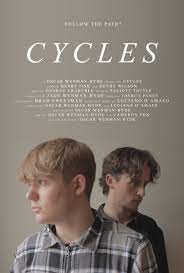
CYCLES
UK, 2022, 67 minutes, Colour.
Henry Fisk, Henry Wilson.
Directed by Oscar Wenman-Hyde.
This is a small feature film, just over an hour’s running time, made on a budget of under £1000, the work of the writer-director, based on his own experiences.
This is a film of dialogue, and would have been very effective performed on stage. As it is, the film opens in the street, the facade of university accommodation, two brothers entering, going upstairs into the room allotted to the younger brother for his studies. The rest of the action takes place in the room – with a variation of momentarily moving into the corridor. At the end, the facade appears, a singer busking outside, and the two brothers leaving.
This is a first film by the writer-director, and the two actors. It was filmed in Bristol.
The theme is important as dramatised by the interactions between the two brothers.
We learn that their father has walked out on the family, they are dependent on their mother who does not appear (except her voice during a phone call) but is a strong presence throughout the interchanges. The brothers are not named, simply the Older and the Younger. The age difference is five years apart.
The key to the issue is that the younger brother has been accepted into a University and has come to the accommodation. He is the personification of self-doubt. By contrast, his older brother has been to university, has married, has a career, and has been asked by their mother to make sure that the younger brother is settled and to help him unpack. The younger brother resents this, the older brother acting with a sense of responsibility.
There are changes of moods throughout the film, especially with the younger brother, reacting badly against his dominating and interfering mother, resentments of the father leaving, happy memories of when he was bonding with the older brother, making it amateur films together, happiness. However, the older brother meets someone, falls in love, the younger brother tagging along to outings, a growing resentment. Then there is a question of favouritism, mother-love, ambitions and dreams, control…
Many audiences will suspect that the younger brother is gay. This is not explicitly said but, at one stage, he receives a text from a friend who announced that he was gay and the younger brother not able to deal with this. The friend, alienated for several months, now sends an encouraging message for his moving to university and adds kisses, a topic for discussion by the older brother and what this means.
So, an hour of mood changes, ups and downs, audiences finding the younger brother alienating, then perhaps more sympathy for him, acknowledging the responsibility of the older brother, but his discovering of his inadequacies in the past – and the domination of their mother.
However, there is a final embrace and, one hopes, hopes for the future, the younger brother in his studies, to be an actor, and communication with the older brother.
There is a song played at the end, a busker in the streets, and, interestingly, the older brother putting a coin in his basket as he passes.